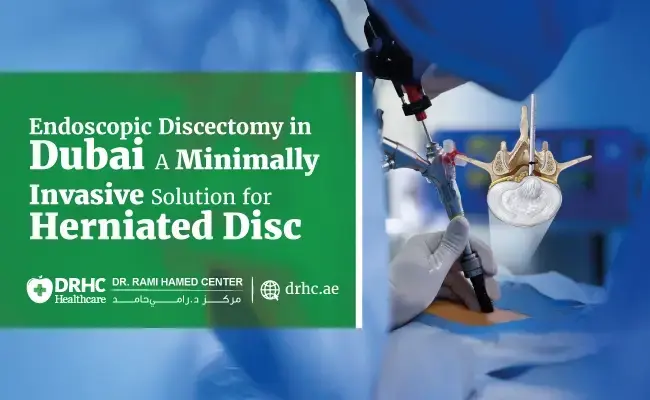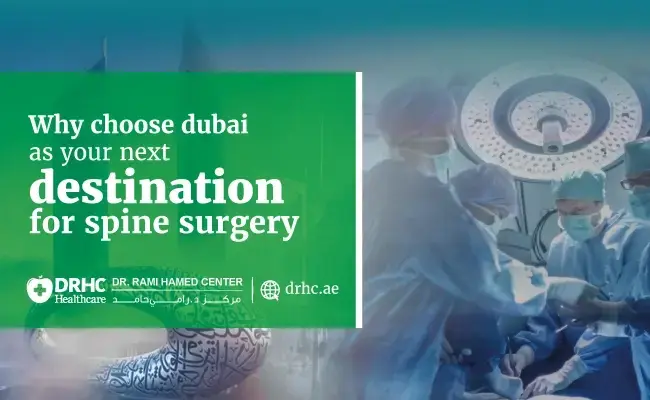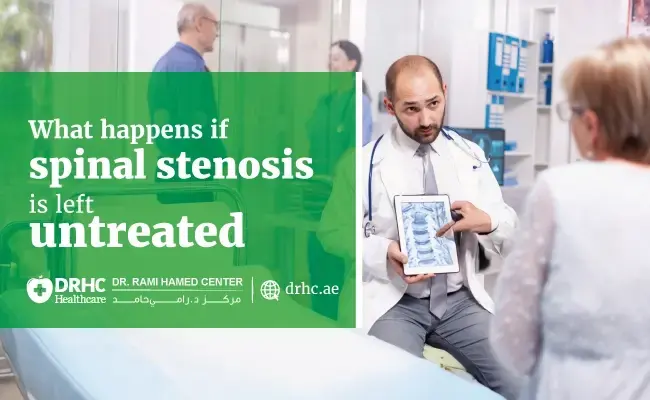
Back pain can have many sources, but two of the most common and closely linked conditions are degenerative disc disease (DDD) and facet joint arthritis. These conditions often develop gradually, sometimes with few symptoms in the early stages. But over time, they can significantly impact your mobility, comfort, and quality of life.
At Dr. Rami Hamed Center (DRHC) in Dubai, we often see patients who are unaware that their back pain is due to a combination of spinal disc and joint degeneration. In this blog, we explain how degenerative disc disease progresses to facet joint arthritis, how to recognize the signs, and what treatments are available to help you stay active and pain-free.
What Is Degenerative Disc Disease?
Despite its name, degenerative disc disease is not actually a disease—it’s a natural part of the aging process. Over time, the spinal discs (which act like shock absorbers between your vertebrae) lose water content, become thinner, and may start to break down. This loss of disc height and flexibility can lead to pain, stiffness, and reduced mobility.
Some people may not notice symptoms early on, while others may experience:
- Chronic low back pain or neck pain
- Pain that worsens with sitting, bending, or lifting
- Occasional numbness or tingling in the arms or legs
How Disc Degeneration Affects the Facet Joints
The facet joints are small joints located at the back of the spine that help with stability and movement. These joints work together with the discs to allow the spine to bend and twist smoothly.
When spinal discs begin to deteriorate, two key changes occur:
- Loss of Disc Height: As the disc becomes thinner, the space between vertebrae narrows.
- Increased Load on Facet Joints: With less cushioning from the disc, more pressure is placed on the facet joints.
Over time, this extra stress can lead to facet joint degeneration, also known as facet joint arthritis or facet arthropathy. Just like arthritis in the knees or hips, this condition causes inflammation, joint stiffness, and pain.
Symptoms of Facet Joint Arthritis
When facet joint arthritis develops, it may present with symptoms such as:
- Localized back or neck pain
- Stiffness, especially in the morning or after rest
- Pain that worsens with standing, twisting, or arching the back
- Radiating pain into the buttocks or thighs (if the lower spine is affected)
- A sensation of “grinding” or “catching” during movement
These symptoms can overlap with those of degenerative disc disease, which is why a thorough evaluation is essential.
Diagnosis and Imaging at DRHC Dubai
At DRHC, we use advanced imaging tools such as MRI, X-rays, and CT scans to evaluate both the spinal discs and facet joints. A detailed physical exam and review of your medical history help us create a clear picture of how far the condition has progressed.
If you’re experiencing ongoing back pain and are unsure of the cause, our team can provide an accurate diagnosis and a customized treatment plan tailored to your needs.
Treatment Options: From Conservative to Advanced Care
We understand that the thought of spinal procedures or surgery can be overwhelming. That’s why our first approach focuses on non-surgical options whenever possible.
Conservative Treatments
- Physical therapy to strengthen muscles and improve posture
- Anti-inflammatory medications for pain relief
- Postural training and lifestyle advice to reduce strain on the spine
- Facet joint injections (steroid + anesthetic) for targeted pain relief
These methods are often effective for early to moderate cases and help reduce inflammation and pain while improving function.
Minimally Invasive Procedures
If conservative treatments are no longer effective, we may consider advanced options such as:
- Radiofrequency ablation (RFA): A procedure that gently heats nerve endings near the facet joints to block pain signals
- Minimally invasive spine surgery: For severe degeneration or nerve compression, small-incision surgery may be recommended to relieve pressure and stabilize the spine
At DRHC Dubai, your comfort and safety are our priorities. Our spine specialists will guide you through every step of your treatment journey with clear explanations and compassionate care.
Explore Our Related Blogs
- How a herniated disc can lead to sciatica
- How spinal stenosis causes neurogenic claudication
- What causes spinal cord compression in cervical spondylosis
- How untreated spondylolisthesis leads to nerve damage
Frequently Asked Questions (FAQs)
Can I prevent degenerative disc disease from turning into facet arthritis?
While aging is unavoidable, maintaining good posture, staying active, and treating disc problems early can reduce your risk of joint degeneration.
Is facet joint arthritis permanent?
The structural changes are typically long-term, but pain and stiffness can often be well-managed with proper treatment.
How do I know if my back pain is from discs or facet joints?
Symptoms overlap, which is why professional evaluation with imaging is essential for an accurate diagnosis.
Will I need surgery?
Not necessarily. Many patients respond well to non-surgical care. Surgery is usually considered only when pain severely impacts your life and doesn’t respond to other treatments.
Is treatment available at DRHC Dubai?
Yes. We offer full diagnostic and treatment services for degenerative disc disease and facet joint arthritis, including conservative care, pain management, and minimally invasive surgical options.
Take the First Step Toward Relief
It’s common to think of back pain as a normal part of aging—but when left untreated, degenerative disc disease can lead to more complex problems like facet joint arthritis. Early intervention can slow the progression, relieve pain, and help you enjoy life more fully.
If you're experiencing persistent back pain or stiffness, let our team at Dr. Rami Hamed Center in Dubai help you get to the root of the problem and find the most effective path to healing.
Dr. Rami Hamed
Consultant Spine & Orthopedic Surgeon
Founder, DRHC – Dubai Healthcare City
📞 +971 4 279 8800
🌐 www.drhc.ae
📍 Dubai Healthcare City, Building 52
Topic: orthopedic Spine Surgery




.jpg)




Leave a comment